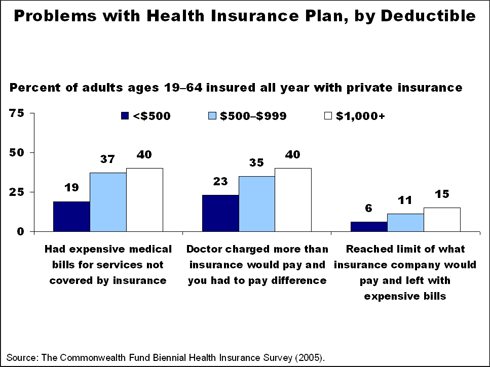One of Five Who Applies for Coverage in Individual Market Is Turned Down or Charged Higher Prices Due to Pre-Existing Conditions
Two of Five Privately Insured Adults Who Had High Deductible Health Plans Had Expensive Medical Bills Not Covered by Insurance
New York, NY, September 14, 2006—A new report from The Commonwealth Fund finds that, as employers cope with rising health care costs by dropping health benefits or increasing employee cost-sharing through higher deductibles, workers and their families are being squeezed. When people lose coverage, many who turn to the individual insurance market find that coverage is unobtainable or unaffordable. The report also finds that those with high-deductible health plans are more likely than those with lower deductibles to have burdensome medical debt and to forego needed health care; those with low incomes are especially at risk.
An overwhelming majority—89%—of working-age adults who sought coverage in the individual market during the past three years ended up never buying a plan. A majority (58%) found it very difficult or impossible to find affordable coverage. One-fifth (21%) of those who sought to buy coverage were turned down, were charged a higher price because of a pre-existing condition, or had a health problem excluded from coverage.
"More workers and their families are losing employer-sponsored health insurance," said Commonwealth Fund Assistant Vice President Sara Collins, lead author of the report. "Most of the increase in the number of uninsured Americans—now upwards of 46.6 million—was due to a decline in workplace coverage. Although the individual market is a last resort for those shut out of employer-sponsored coverage, it is by no means a safe or secure haven for everyone."

People with High-Deductible Health Plans Face Potentially Large Cost Burdens
The report also highlights the increasing cost burdens families are facing due to the decline in the quality of coverage and more cost-shifting to employees. Adults with high-deductible health plans—both those with individual market or employer-based coverage—have higher out-of-pocket costs than do those with lower-deductible plans. In addition, many adults with such plans are left with burdensome medical bills because of limits to their insurance coverage. Two of five (40%) of those with deductibles over $1,000 had expensive medical bills for services not covered by their insurance, compared to about one-fifth (19%) of those with deductibles under $500.
The report, Squeezed: Why Rising Exposure to Health Care Costs Threatens the Health and Financial Well-Being of American Families, by Commonwealth Fund Assistant Vice President Sara Collins and colleagues, is based on findings from the Commonwealth Fund 2005 Biennial Health Insurance Survey.
Those with high deductible health plans were also more likely to report that they did not get needed health care or prescription drugs because of costs. In addition, many adults with such plans said they had problems with medical bills or were paying off medical debt over time and were more likely to give low ratings to their coverage. Two of five (41%) of those with deductibles over $1,000 had medical bill problems compared to about 23 percent of those with deductibles under $500. Two of five (41%) of those with higher deductibles rated their health plan fair or poor, compared to 15 percent of those with lower deductibles.
"Increasing the amount people pay for their health insurance and health care imposes a burden on low and moderate income families. It is increasingly difficult even for those with insurance to obtain the health care they need to be healthy and productive," said Commonwealth Fund President Karen Davis. "We need a national solution to the problem of affordable and comprehensive coverage for all, following the lead of states like Maine, Massachusetts and Vermont that have expanded coverage through shared financial contributions from individuals, employers, and government."
Other key findings from the report include:
Individual health coverage is more expensive
- Two of five (43%) adults with individual coverage spent 5 percent or more of income on premiums, compared to 14 percent with employer-sponsored coverage.
- More than one-third (37%) of adults with individual coverage have annual deductibles of $1,000 or more.
Increasing deductibles linked to poorer access, satisfaction with health care
- Adults with high deductibles are less satisfied with the quality of the health care they have received: less than one-third (29%) of those with deductibles over $1,000 are very satisfied with quality, compare to over half (54%) of those with deductibles under $500.
- Nearly half (44%) of those with deductibles over $1,000 experienced problems with access to care (didn't fill a prescription, didn't see a specialist when needed, skipped a recommended test, treatment, or follow-up, or had a medical problem and didn't go to a doctor or clinic) compared with one-quarter (25%) of those with deductibles under $500.
- One-fifth (22%) of those with higher deductibles took on credit card debt to pay medical bills, compared to 8 percent of those with lower deductibles.


